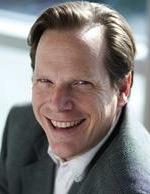ME Seminar on "Better living through biosensors"
Events | Mechanical Engineering
ME Seminar on "Better living through biosensors"
October 6, 2014 8:30 AM

Speaker
Dr. Kevin Plaxco, UC Santa Barbara Chemical Engineering
Location
ESB 1001
Type
Seminar
Abstract: The ideal sensor will be sensitive, specific, versatile, small enough to hold in your hand, selective enough to work even when faced with complex, contaminant-ridden samples and, ultimately, continuous and real-time. Given the affinity, specificity and generalizability of biomolecular recognition, biosensors have been widely touted for their potential to meet these challenging goals. To date, however, the translation of protein- and nucleic acid-binding events into convenient, highly selective sensing platforms has proven difficult. We have solved this problem by employing the ligand-induced folding of biopolymers as a robust means of transducing binding events into specific, easily detected outputs. Our electronic, folding-based sensors are rapid (minutes to seconds), sensitive (micromolar to femtomolar), reversible (supporting continuous
measurements) and generalizable to an enormous range of protein, nucleic acid and small molecule targets. The sensors are also reagentless, reusable, and selective enough to be employed in blood serum, soil and other grossly contaminated samples. Because of their sensitivity, background suppression, operational convenience and impressive scalability folding-based biosensors appear ideally suited for diagnostics at the point of care and in the developing world.
Bio: Kevin Plaxco is a Professor at the University of California, Santa Barbara, with a shared appointment between the Department of Chemistry and Biochemistry and the Biomolecular Science and Engineering graduate program. Prof. Plaxco also serves as Associate Director of campus’s Center for Bioengineering. Prior to joining UCSB in 1998 Dr. Plaxco received his Ph.D. from Caltech and performed postdoctoral studies at Oxford and the University of Washington. Dr. Plaxco’s research focus is on the physics of biomolecular folding and its engineering applications. A major aim of the group’s applied research is to harness the speed and specificity of folding in the development of sensors, adaptable surfaces, and smart materials. Dr. Plaxco has co-authored numerous patents and more than 170 papers on protein folding, protein dynamics, and folding-based sensors and materials, and in 2014 was recognized by Thomson Reuters at one of the most highly cited chemists of the last decade. He has also written a popular science book on Astrobiology.
Host: Prof. Megan Valentine